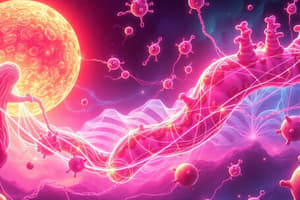Podcast
Questions and Answers
What is biochemistry primarily concerned with?
What is biochemistry primarily concerned with?
- The chemical processes that occur within living organisms (correct)
- The biological diversity of organisms
- The study of ecosystems and their interactions
- The geological formations of Earth
What does metabolism refer to?
What does metabolism refer to?
- The process of synthesizing energy molecules
- The formation of genetic material
- All chemical reactions occurring in a living organism (correct)
- The breakdown of nutrients into energy
Which of the following processes is an example of anabolism?
Which of the following processes is an example of anabolism?
- Glycolysis
- Breakdown of fatty acids
- Conversion of glucose to ATP
- Synthesis of proteins from amino acids (correct)
What is the primary function of ATP in cells?
What is the primary function of ATP in cells?
Which process produces ATP during cellular respiration?
Which process produces ATP during cellular respiration?
What is catabolism primarily associated with?
What is catabolism primarily associated with?
What is a key characteristic of anabolic processes?
What is a key characteristic of anabolic processes?
Which of the following processes is NOT an example of metabolism?
Which of the following processes is NOT an example of metabolism?
What role does ATP play in cells?
What role does ATP play in cells?
Which of the following factors contributes to obesity?
Which of the following factors contributes to obesity?
What is one consequence of insulin resistance in the context of obesity?
What is one consequence of insulin resistance in the context of obesity?
Which hormone is primarily released during chronic stress?
Which hormone is primarily released during chronic stress?
What is a common treatment strategy for managing obesity?
What is a common treatment strategy for managing obesity?
How can chronic stress impact the immune system?
How can chronic stress impact the immune system?
What lifestyle change can help improve insulin sensitivity?
What lifestyle change can help improve insulin sensitivity?
Which technique is recommended for managing stress?
Which technique is recommended for managing stress?
Flashcards are hidden until you start studying
Study Notes
Introduction to Biochemistry
- Biochemistry is the study of chemical processes within living organisms.
- It focuses on the structure, function, and interaction of biological molecules like proteins, carbohydrates, lipids, and nucleic acids to sustain life.
Metabolism
- Metabolism refers to all chemical reactions within a living organism.
- It's a complex, interconnected network of reactions enabling growth, reproduction, and maintenance of internal environment.
Anabolism: Building Complex Molecules
- Anabolism involves building complex molecules from simpler ones, requiring energy input.
- Examples include protein synthesis from amino acids, glycogen formation from glucose, and fatty acid synthesis from acetyl-CoA.
Catabolism: Breaking Down Complex Molecules
- Catabolism involves breaking down complex molecules into simpler ones, releasing energy.
- Examples include protein breakdown into amino acids, glycolysis (glucose breakdown), and beta-oxidation (fatty acid breakdown).
ATP: The Energy Currency of Cells
- Adenosine triphosphate (ATP) is the primary energy carrier in cells.
- ATP stores and releases energy when broken down into adenosine diphosphate (ADP), providing energy for cellular processes.
ATP Production
- Cellular respiration: Glucose and other molecules are broken down to produce ATP in the mitochondria.
- Photosynthesis: Plants use sunlight to convert carbon dioxide and water into glucose and oxygen, producing ATP.
Biochemistry and Metabolism in Illness and Recovery
- Obesity: Excessive body fat accumulation associated with metabolic dysfunction like insulin resistance, type 2 diabetes, and cardiovascular disease.
- Stress: A physiological response to perceived threats causing hormonal changes like cortisol release, affecting blood sugar and fat storage.
Factors Contributing to Obesity
- Energy imbalance: Excess calorie intake and insufficient physical activity lead to weight gain.
- Insulin resistance: Cells become less responsive to insulin, causing hyperglycemia and potentially leading to type 2 diabetes.
- Inflammation: Chronic low-grade inflammation linked to obesity contributing to various health issues.
Obesity Treatment Strategies
- Dietary changes: Reducing calorie intake and increasing nutrient-dense foods aid in weight loss.
- Exercise: Regular physical activity boosts metabolism, improves insulin sensitivity, and aids in weight management.
- Medication: Medications can aid weight loss or address underlying conditions like diabetes in some cases.
Stress and Metabolism
- Hormonal changes: Stress releases cortisol, a hormone increasing blood sugar and promoting fat storage.
- Immune system suppression: Chronic stress weakens the immune system, making individuals more susceptible to infections and diseases.
Managing Stress
- Stress management techniques: Relaxation techniques, meditation, and yoga help reduce stress levels.
- Regular exercise: Physical activity alleviates stress and improves overall well-being.
- Adequate sleep: Sufficient sleep is essential for maintaining a healthy stress response.
Studying That Suits You
Use AI to generate personalized quizzes and flashcards to suit your learning preferences.



